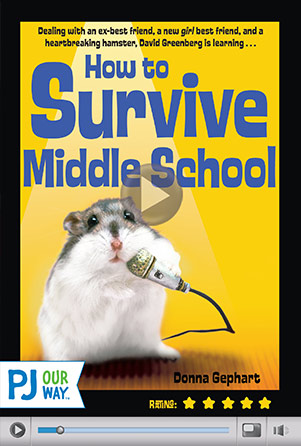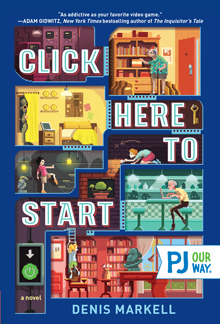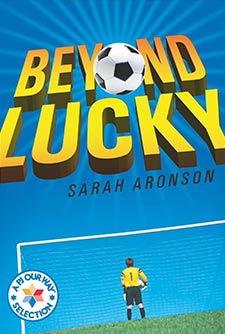How to Survive Middle School
Welcome to TalkTime with David Greenberg, where you can meet cute hamsters, hear exclusive interviews with famous talk show hosts, and learn how to survive 6th grade!
Average Rating
( hint: Login to leave a review! )
359 Reviews
Leave Review
What the Book is About
Jewish Content & Values
Positive Role Models
Content Advisory
Talk it Over!
More for You
What the Book is About
David Greenberg’s big dream is to become a TV host like Jon Stewart, and he's well on his way: home videos that he has posted on YouTube featuring his cute hamster and acne-plagued older sister have become an internet sensation. But as his online popularity soars, his real life gets increasingly worse: he is picked on by the school bully; he fights with his best friend; and he misses his mom, who has left the family to resolve her own issues. How to Survive Middle School is a sweet coming-of-age book about friendship, family, and following one’s dreams.
Jewish Content & Values
- David’s bubbe (grandmother) sprinkles lots of Yiddish words into her conversations and feeds David traditional Jewish foods like chopped liver and bagels.
- David discovers that Albert Einstein and Jon Stewart are both Jewish.
- When David expresses genuine remorse about posting pictures of his sister Lindsay on YouTube, he’s exhibiting the Jewish value of teshuva (regret). Lindsay then forgives David, an example of mechilla (forgiveness). Furthermore, David and Elliott pick on each other, but they eventually resolve their differences.
Positive Role Models
- David’s sister, Lindsay, is embarrassed and angry when she realizes that David has posted photos of her face, in various acne phases, on YouTube. Nevertheless, she forgives him and remains a supportive older sister, celebrating David’s successes and comforting him after he is bullied.
- Bubbe is a loving figure in David’s motherless home, cooking dinner and providing warm hugs and a listening ear.
Content Advisory
There are a few bullying episodes and some mild teen language in this book. David’s older cousin puts him in a headlock, and Tommy Murphy, a mean eighth grade bully, shoves David’s head in a toilet in a humiliating episode that has the paradoxical effect of restoring David’s close friendship with his former friend, Elliott. Kids occasionally argue with one another using insults like “moron” and “jerk,” and they talk about how middle school “sucks.”
Talk it Over!
David learns the hard way that posting embarrassing pictures and videos of friends and family on the internet is a really bad idea. What are some other rules you should follow to be a responsible web citizen?
More for You
The famed scholar Maimonides wrote that asking for forgiveness from someone you have wronged is integral to true repentance. Maimonides further wrote that the victim is permitted to refuse to grant forgiveness the first time he is asked, and the perpetrator is encouraged to return a second time and even a third time to ask again. If the victim still won’t forgive after three sincerely remorseful tries, the perpetrator is considered to have atoned, even if he hasn’t been granted forgiveness.
What the Book is About
What the Book is About
David Greenberg’s big dream is to become a TV host like Jon Stewart, and he's well on his way: home videos that he has posted on YouTube featuring his cute hamster and acne-plagued older sister have become an internet sensation. But as his online popularity soars, his real life gets increasingly worse: he is picked on by the school bully; he fights with his best friend; and he misses his mom, who has left the family to resolve her own issues. How to Survive Middle School is a sweet coming-of-age book about friendship, family, and following one’s dreams.
Jewish Content & Values
Jewish Content & Values
- David’s bubbe (grandmother) sprinkles lots of Yiddish words into her conversations and feeds David traditional Jewish foods like chopped liver and bagels.
- David discovers that Albert Einstein and Jon Stewart are both Jewish.
- When David expresses genuine remorse about posting pictures of his sister Lindsay on YouTube, he’s exhibiting the Jewish value of teshuva (regret). Lindsay then forgives David, an example of mechilla (forgiveness). Furthermore, David and Elliott pick on each other, but they eventually resolve their differences.
Positive Role Models
Positive Role Models
- David’s sister, Lindsay, is embarrassed and angry when she realizes that David has posted photos of her face, in various acne phases, on YouTube. Nevertheless, she forgives him and remains a supportive older sister, celebrating David’s successes and comforting him after he is bullied.
- Bubbe is a loving figure in David’s motherless home, cooking dinner and providing warm hugs and a listening ear.
Content Advisory
Content Advisory
There are a few bullying episodes and some mild teen language in this book. David’s older cousin puts him in a headlock, and Tommy Murphy, a mean eighth grade bully, shoves David’s head in a toilet in a humiliating episode that has the paradoxical effect of restoring David’s close friendship with his former friend, Elliott. Kids occasionally argue with one another using insults like “moron” and “jerk,” and they talk about how middle school “sucks.”
Talk it Over!
Talk it Over!
David learns the hard way that posting embarrassing pictures and videos of friends and family on the internet is a really bad idea. What are some other rules you should follow to be a responsible web citizen?
More for You
More for You
The famed scholar Maimonides wrote that asking for forgiveness from someone you have wronged is integral to true repentance. Maimonides further wrote that the victim is permitted to refuse to grant forgiveness the first time he is asked, and the perpetrator is encouraged to return a second time and even a third time to ask again. If the victim still won’t forgive after three sincerely remorseful tries, the perpetrator is considered to have atoned, even if he hasn’t been granted forgiveness.




